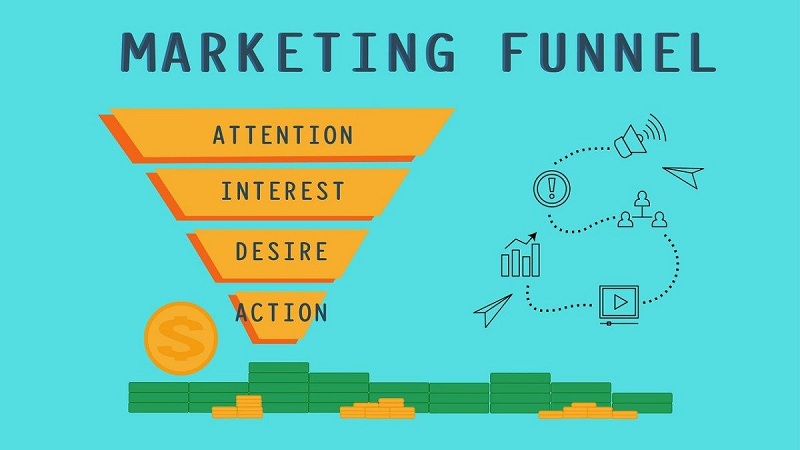The marketing funnel is a fundamental concept in the world of business and marketing that serves as a tool for mapping and measuring the customer journey. This concept visualizes a series of steps taken by potential customers, starting from not knowing a brand to becoming loyal customers.
For a business, a deep understanding of this marketing funnel is crucial for developing strategies that are not only effective in attracting attention but also optimize conversion opportunities at every stage. By understanding how this marketing concept works, a business can identify its strengths and weaknesses in the marketing process. In addition, it can align its efforts to maximize results.

flip.id
The marketing funnel can be likened to a funnel, where the top is wide and accommodates many individuals who are not yet familiar with the brand or product. As time passes and stages progress, this number of individuals will narrow. Those who remain at the bottom of the funnel are potential customers who are more ready to make a purchase.
This model not only drives sales, but also helps businesses understand customer interactions with the brand. It serves as a roadmap that guides potential customers through various stages, from first learning about the product, to evaluating it, and finally making a purchase decision.
Eventually, they become loyal customers and even recommend the product to others. In the context of digital marketing, the funnel concept is a powerful tool for planning strategies, strengthening customer relationships, and achieving long-term success.
Key Stages in the Marketing Funnel
To implement an effective strategy, a business must understand the stages that occur in this marketing concept in sequence. These stages describe changes in the attitudes and interests of potential customers towards a product or service.
1. Awareness
This is the top and widest stage of the funnel. The goal is to introduce the brand or product to a wide audience. At this stage, potential customers begin to learn about the product through advertisements, promotions, or marketing content. The right marketing strategies, such as content marketing and digital advertising, are essential for building initial awareness.
2. Interest
After becoming aware of the brand, potential customers will enter the interest stage. They begin to show interest and seek more information about the products or services offered. At this stage, a business needs to provide informative and engaging content to help potential customers understand the value they can get. Examples include blog articles, e-books, or webinars.
3. Consideration
At this stage of the marketing funnel, the interest of potential customers has been confirmed. They then begin to consider whether the product or service is the right solution for their needs. They will compare the products offered with competitors in the market. Businesses must be able to convince customers of the added value of their products through strategies such as testimonials, case studies, or product demonstrations.
4. Decision or Purchase
This is a crucial moment when potential customers decide to buy after going through a series of considerations. The purchasing process must be made easy and smooth. Strategies such as special offers, discounts, or bundling packages are often used to encourage purchasing decisions.
5. Retention and Advocacy
The marketing funnel does not end with the purchase. The retention stage focuses on retaining customers so that they make repeat purchases and do not switch to competitors. Meanwhile, advocacy is the pinnacle of customer satisfaction. Satisfied customers will recommend the product to others, becoming valuable brand promoters. Customer loyalty will generate positive testimonials organically, thereby increasing brand visibility.
Implementing the Funnel Concept in Strategy
Applying the marketing funnel allows a business to design targeted and efficient strategies at every stage of the customer journey.
Relevant Content Marketing
At the awareness and interest stages, content is key. Content must be relevant to the audience’s needs, easy to find through search engine optimization (SEO), and distributed appropriately across various digital channels.
Utilizing Email Marketing
Email marketing is highly effective for nurturing leads in the consideration and decision stages. Personalized communication based on the interests and behavior of potential customers can guide them further down the funnel until they make a purchase.
Conversion Optimization
Landing pages must be optimized at the decision stage. A business needs to ensure there is a clear call-to-action (CTA), a simple form, and other convincing elements, such as testimonials, to maximize conversions.
Continuous Analysis
The marketing funnel is not a static strategy. Businesses must continuously monitor metrics such as conversion rates, bounce rates, and customer lifetime value. This is to evaluate the strategies that have been used and make improvements. This analysis helps identify barriers in the purchasing process and find solutions to improve efficiency.
The marketing funnel is an important foundation for developing effective marketing strategies. Each stage, from awareness to advocacy, plays a major role in guiding the journey of potential customers. By understanding and implementing the funnel correctly, opportunities to increase conversions and customer loyalty will become more open.
It’s time to showcase your creative ideas and advertisements to increase brand visibility with Rebound Ads. With a well-planned and creative marketing strategy, each stage of the marketing funnel can be optimized to support sustainable sales growth.
